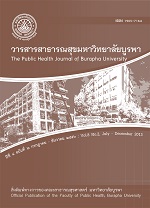Effects of Mother-Participating Program on Sexual Communication between Mother and Early Female Adolescents
Main Article Content
บทคัดย่อ
This quasi-experimental research was aimed to examine the effects of motherparticipating
program of communication on attitudes of parent-adolescent communication,
comfort with communication related to sexual topics, and communication skill.
A sample of 60 mothers of adolescent females was randomly assigned to treatment
group (n=30) and control group (n= 30). Both groups received knowledge content
about birth control and condom use, going out with boyfriends, contraceptive use,
managing sexual desire and principles of family communication for 2 hours. Intervention
group was received the Appreciation-Influence-Control (AIC) Interventions
consisted of five 60–90 minutes modules implemented on two consecutive Saturdays,
including small-group discussions, videos, interactive exercises such as role–plays,
and skills-building activities. Mothers in treatment group also received content to
support sexual–specific communication (e.g., parental values and standards about
sex, how to avoid risky situations, dealing with discomfort about communication)
and parent–adolescent communication in general (e.g., aspirations for their children,
creating opportunities for communication). Mothers were provided with “homework”
that was to be completed with their adolescent in between sessions as a means of
practicing some of the communication strategies presented in the program within
2 weeks. Measures were administered at baseline and 2-weekposttest. Data were
collected by self-administered questionnaires and analyzed by Chi-square test, Independent
t-test and Dependent t-test. The findings indicated that mothers in the
Mother-Participation Intervention had significantly more positive attitudes towards
communication (p < .001), more comfort with communication (p < .05), and more
skills of sexual risk communication (p < .05) than mothers in the control group.
This result suggested that participation learning played important role to develop
maternal competency of communication with daughter about sexual initiation and
safe sex.

